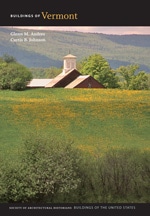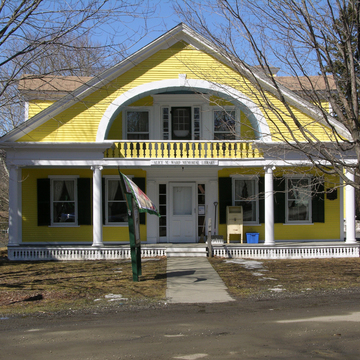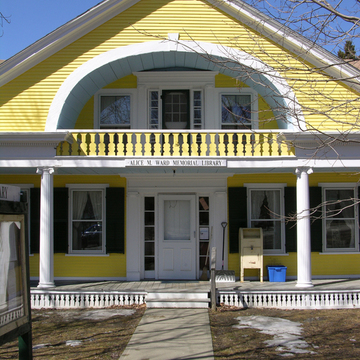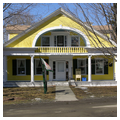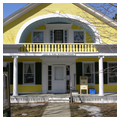You are here
Ward Memorial Library (Jacob's Stand)
Fernando C. Jacobs, a native of Warren, Vermont, built a tannery in Canaan village in 1845. The following year he built this striking house, which he operated as a “stand” or tavern stop on the stagecoach route from Franklin, New Hampshire, to Montreal between 1846 and 1860. Its broad front gable shelters a recessed segmental-arched balcony over a full recessed porch with four fluted Ionic columns in the characteristic arrangement known as the Connecticut River Valley porch. The placement of the porch columns, with the two central columns directly below the balcony pilasters, emphasizes the Palladian origins of this distinctive Vermont vernacular design. Its evolution from Federal to Greek Revival is further apparent in the applied Ionic entrance pilasters and the staircase in the central hall. Two rooms that flank each side of the hall on both floors served as guest quarters, a room for meals, and the Canaan post office from 1849 to 1854, with Jacobs as postmaster. Known for his antislavery Republican views, Jacobs is reputed to have used the stand as the northernmost stop on the Connecticut River branch of the Underground Railroad. After Jacobs moved in 1860 to Pittsburg, New Hampshire, to open the Connecticut Lake House Hotel, the building became a residence. Artemas and Alice M. Ward purchased it in 1888 and added the hipped-roof carriage barn and cupola onto the rear ell and a pair of dormers on either face of the gable roof. Alice Ward subsequently bequeathed the building to Canaan for a public library, which remains in use.
Writing Credits
If SAH Archipedia has been useful to you, please consider supporting it.
SAH Archipedia tells the story of the United States through its buildings, landscapes, and cities. This freely available resource empowers the public with authoritative knowledge that deepens their understanding and appreciation of the built environment. But the Society of Architectural Historians, which created SAH Archipedia with University of Virginia Press, needs your support to maintain the high-caliber research, writing, photography, cartography, editing, design, and programming that make SAH Archipedia a trusted online resource available to all who value the history of place, heritage tourism, and learning.














